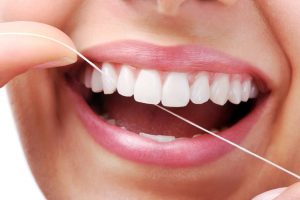 Your life centers on routines: work, school, your kids’ soccer schedules. That same discipline must apply to your health, too, with proper nutrition, exercise and taking care of your oral health. The American Dental Association recommends daily flossing and twice daily brushing. The team at Mt. Holly Family Dentistry urges patients to brush their teeth in the morning and at bedtime, too. That nightly discipline really benefits your smile. (more…)
Your life centers on routines: work, school, your kids’ soccer schedules. That same discipline must apply to your health, too, with proper nutrition, exercise and taking care of your oral health. The American Dental Association recommends daily flossing and twice daily brushing. The team at Mt. Holly Family Dentistry urges patients to brush their teeth in the morning and at bedtime, too. That nightly discipline really benefits your smile. (more…)
December 20, 2016
Dentist in Mt. Holly: Brush Your Teeth Before Bedtime
December 7, 2016
Your Mt. Holly Dentist Tells Why You Should Floss
 The US Department of Health and Human Services says flossing is an important part of daily oral hygiene for patients of all ages. The professional staff at Mt. Holly Family Dentistry says flossing removes sticky, bacteria-filled plaque, protecting your mouth from cavities and gum disease. Flossing is easy, and it’s really effective. Paired with brushing and preventive dental care keeps smiles bright and overall health strong. (more…)
The US Department of Health and Human Services says flossing is an important part of daily oral hygiene for patients of all ages. The professional staff at Mt. Holly Family Dentistry says flossing removes sticky, bacteria-filled plaque, protecting your mouth from cavities and gum disease. Flossing is easy, and it’s really effective. Paired with brushing and preventive dental care keeps smiles bright and overall health strong. (more…)
June 21, 2016
Mt. Holly gum disease and its impact on overall health
 Almost 50 percent of adult Americans suffer from some form of gum disease. From mild gingivitis to serious periodontitis, gums affect your teeth and your systemic health, too. What does your Mt. Holly family dentist do to treat gum disease and restore smiles to complete health? (more…)
Almost 50 percent of adult Americans suffer from some form of gum disease. From mild gingivitis to serious periodontitis, gums affect your teeth and your systemic health, too. What does your Mt. Holly family dentist do to treat gum disease and restore smiles to complete health? (more…)
November 17, 2015
Get to Know the Warning Signs of Gum Disease Mt Holly
 According to some recent research, mild to severe periodontal (gum) disease may affect up to 80% of US adults over 30. More conservative estimates from the Centers for Disease Control and Prevention place the number between 50 and 60%, but don’t include patients with gingivitis, the mildest from of periodontal disease. The research may not agree on the number of people who suffer from periodontal disease, but dental researchers agree that gum disease is a serious problem in the US. Gum disease occurs when plaque or tartar build up around the gum line causing tissue irritation. Sources also vary on why the number of US adults with gum disease is so high, but some of the leading causes of gum disease include poor oral hygiene, hormonal changes, diabetes, genetic predisposition, and high risk behaviors (smoking, high sugar diet, and excessive drinking). Whatever the cause, it’s essential that patients know the signs of gum disease, and seek treatment as soon as possible. The best way to avoid developing advanced periodontal disease is to make six month dental checkups and teeth cleanings part of your oral hygiene routine.
According to some recent research, mild to severe periodontal (gum) disease may affect up to 80% of US adults over 30. More conservative estimates from the Centers for Disease Control and Prevention place the number between 50 and 60%, but don’t include patients with gingivitis, the mildest from of periodontal disease. The research may not agree on the number of people who suffer from periodontal disease, but dental researchers agree that gum disease is a serious problem in the US. Gum disease occurs when plaque or tartar build up around the gum line causing tissue irritation. Sources also vary on why the number of US adults with gum disease is so high, but some of the leading causes of gum disease include poor oral hygiene, hormonal changes, diabetes, genetic predisposition, and high risk behaviors (smoking, high sugar diet, and excessive drinking). Whatever the cause, it’s essential that patients know the signs of gum disease, and seek treatment as soon as possible. The best way to avoid developing advanced periodontal disease is to make six month dental checkups and teeth cleanings part of your oral hygiene routine.
(more…)
November 7, 2015
Top Foods to Prevent Tooth Decay from Your Family Dentist Mt Holly, NJ
 You’ve probably heard the phrase you are what you eat. This adage is commonly repeated by physicians, diet books, and mothers to their children, but it was originally used in 1923 by Victor Lindlahr. He was a nutritionist, and one of the first people who believed in a direct link between the foods we consume and our health. While his research was a bit spotty, a 1993 study revealed that diet was the 2nd leading cause of death in the US linked to 300,000 deaths compared to the 400,000 deaths that were tobacco related. Suffice it to say, Lindlahr, your doctor, diet books, and mother may have been right when they said you are what you eat. It will likely come as no surprise that dentists agree. Nutrition significantly impacts oral health. Maybe even more than it does whole body health since the foods and beverages we consume react directly with bacteria in the mouth, and high sugar or carbohydrate diets create an acidic biofilm that causes tooth decay. When it comes to protecting oral and overall health, maintaining a well-balanced diet in addition to thorough at-home hygiene and regular dental checkups is essential.
You’ve probably heard the phrase you are what you eat. This adage is commonly repeated by physicians, diet books, and mothers to their children, but it was originally used in 1923 by Victor Lindlahr. He was a nutritionist, and one of the first people who believed in a direct link between the foods we consume and our health. While his research was a bit spotty, a 1993 study revealed that diet was the 2nd leading cause of death in the US linked to 300,000 deaths compared to the 400,000 deaths that were tobacco related. Suffice it to say, Lindlahr, your doctor, diet books, and mother may have been right when they said you are what you eat. It will likely come as no surprise that dentists agree. Nutrition significantly impacts oral health. Maybe even more than it does whole body health since the foods and beverages we consume react directly with bacteria in the mouth, and high sugar or carbohydrate diets create an acidic biofilm that causes tooth decay. When it comes to protecting oral and overall health, maintaining a well-balanced diet in addition to thorough at-home hygiene and regular dental checkups is essential.
(more…)
September 15, 2015
Mt. Holly Dentist Urges You to Kick the Habit
 In the last few years, the United States has seen a significant fall in the number of people who smoke tobacco. In fact, the number recently fell below 17 percent for the first time ever. That’s excellent news for public health, as we all know the detrimental effects that smoking has our bodies.
In the last few years, the United States has seen a significant fall in the number of people who smoke tobacco. In fact, the number recently fell below 17 percent for the first time ever. That’s excellent news for public health, as we all know the detrimental effects that smoking has our bodies.
Over the years, we at Mt. Holly Family Dentistry have seen the terrible side effects smoking has on the mouth. It’s harmful for the gums, the tongue, it accelerates decay and makes your breath smell terrible — and those are only a few of the ways smoking affects oral health. While there definitely are some long-lasting effects, the good news is that the mouth is able to recover from the damage done by smoking. To help our patients understand this, sometimes we use a real-life example — one that we’ve witnessed firsthand many times.
One Mt. Holly Patient’s Smoking Story
One of our patients was in otherwise excellent health: a father of two, he exercised regularly and made a point to eat as well as he could. The only mar on his health record was that he was a moderate smoker. Unfortunately, this habit almost negated everything else he was doing right in terms of his health — especially in his mouth.
Short- and Long-Term Effects of Smoking
The fact is it doesn’t quite matter how well you brush and floss if you’re smoking regularly. This patient’s gums were red, inflamed and he told us that they were likely to bleed after flossing. These are all signs of gum disease, a common side effect of smoking — smokers are actually six times more likely to develop the condition than nonsmokers. Other side effects are dry mouth, excessive tartar buildup and bad breath.
This patient knew he was on his way to serious problems if he didn’t kick the habit soon. We told him all about the long-term effects of smoking — increased risk of bone loss in the jaw, leukoplakia (white spots in the mouth) and oral cancer — and that quitting now was the only way to greatly reduce his chances of contracting a serious disease.
Quitting Smoking for Oral Health
It’s a speech we’ve given to many of our patients: the importance of quitting smoking, today. Unfortunately, smoking is a powerful habit that many have extreme difficulty breaking. When this patient left our office, we were unsure if he’d be able to kick the habit.
When he came back for his next visit in six months, however, he was thrilled to tell us something. Little by little, he’d managed to quit smoking! When his Mt. Holly dentist examined his mouth, he was happy to report gums that were less swollen, and less tartar and plaque buildup than in previous visits. This patient is now on his way to a mouth that’s healthier than ever — and we’re so happy to have been a small part of his health success story.
Visit Us Today
If you’re among the less than 17 percent of adults who still smoke — or if you have a loved one who is — please don’t fall behind on your dental checkups. Smoking increases your risk for a host of oral problems, so come see us today. Maybe we can help you kick that habit, too.
September 3, 2015
What You Can Do for Excellent Oral Health
 Good oral health is something we take for granted. When I’m crunching on an apple (or biting into the occasional big juicy burger), I’m not giving my teeth a second thought — and I’m even in the healthy tooth business. No, it’s not until we have a problem with our mouths that we really realize how lucky we are to have strong, healthy, beautiful teeth.
Good oral health is something we take for granted. When I’m crunching on an apple (or biting into the occasional big juicy burger), I’m not giving my teeth a second thought — and I’m even in the healthy tooth business. No, it’s not until we have a problem with our mouths that we really realize how lucky we are to have strong, healthy, beautiful teeth.
We want to remind you at every opportunity how important it is to care for your teeth while they’re healthy, instead of waiting until there’s a problem to get serious about brushing, flossing and visiting your dentist. By that point, it may be too late. At your Mt. Holly dental office, we’ll never get tired of seeing your healthy, beautiful smile — so keep the following tips in mind and enjoy good oral health for a lifetime.
(more…)
August 19, 2015
Flossing Helps Keep Your Mouth Clean and Happy
 When you brush your teeth (twice a day, we hope), are you also flossing? If the answer is yes, good job! Keep doing what you’re doing. If you aren’t flossing, you’re not doing your mouth any favors. Flossing is one of the most important steps in keeping a healthy mouth. It should always be a part of your daily dental hygiene regimen no matter what. When you wake up in the morning, does your mouth feel a little bit clean or did you bypass brushing and flossing the night before? If you did, does your mouth feel a lot nastier than normal? That’s because all those tasty bits of food you enjoyed last night are now caught in between, on and around your teeth. Brushing helps remove most of it, but floss reaches those tiny spaces where said food particles and other bacteria love to hang out. The Mt. Holly Family Dentistry team is headed by the dentist Mr. Holly, NJ calls their own: Dr. William Greenberg.
When you brush your teeth (twice a day, we hope), are you also flossing? If the answer is yes, good job! Keep doing what you’re doing. If you aren’t flossing, you’re not doing your mouth any favors. Flossing is one of the most important steps in keeping a healthy mouth. It should always be a part of your daily dental hygiene regimen no matter what. When you wake up in the morning, does your mouth feel a little bit clean or did you bypass brushing and flossing the night before? If you did, does your mouth feel a lot nastier than normal? That’s because all those tasty bits of food you enjoyed last night are now caught in between, on and around your teeth. Brushing helps remove most of it, but floss reaches those tiny spaces where said food particles and other bacteria love to hang out. The Mt. Holly Family Dentistry team is headed by the dentist Mr. Holly, NJ calls their own: Dr. William Greenberg.
Flossing can keep your teeth a lot cleaner than you think. Those tiny spaces can keep food particles trapped, and that’s what causes some side effects including bad breath. It’s time to stop punishing your oral health and give it the care it deserves.
Ready, set, floss!
(more…)
